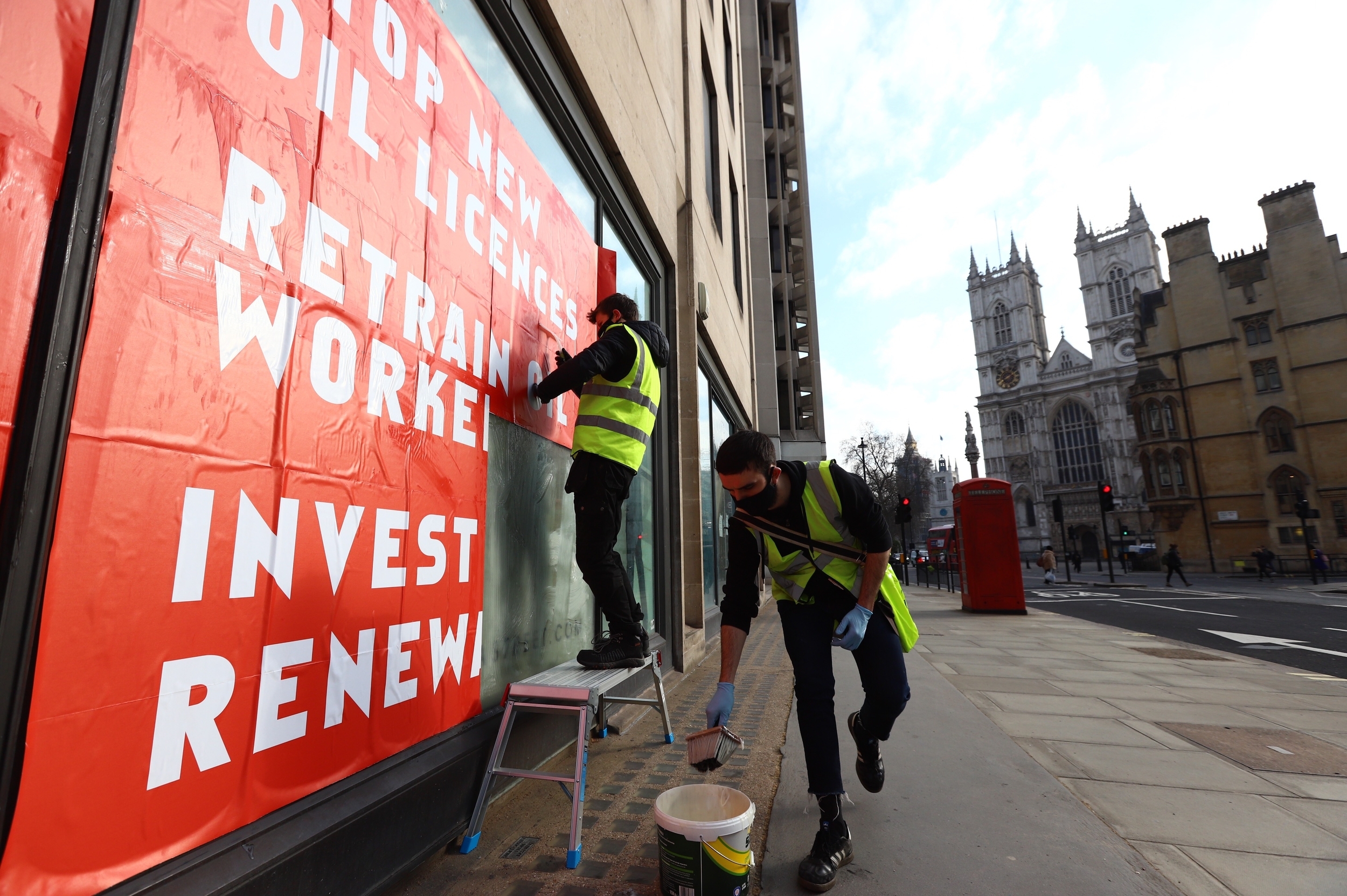- Outcome of government review into future oil and gas licensing is expected ‘soon’.
- Existing licences for oil and gas extraction already prevent the UK from being aligned with the Paris Agreement.
- Greenpeace activists place posters opposite the BEIS department, calling on the Energy Minister to cancel future licensing and back a smooth transition to renewables.
PICS will be available here.
New oil and gas licences in the UK could see carbon emissions reach the equivalent of 25 Cumbria coal mines, campaigners have warned.
If the government goes ahead with plans to issue new oil and gas licenses in UK waters, an estimated 14.3 billion barrels of oil equivalent of oil and gas could be extracted by 2050, which would release up to 5.7 gigatonnes of CO2 emissions when burned. That figure is 25 times the emissions expected from a proposed coal mine in Cumbria, which attracted much controversy for the government [1].
“Energy Minister Anne-Marie Trevelyan must rule out granting any new oil and gas licences…
Mel Evans, head of Greenpeace UK’s oil campaign, said: “The UK will make a fool of itself in the run-up to hosting the COP26 global climate talks if our Energy Minister signs off on new oil and gas licences that serve to rip up the Paris Agreement.
“We know the government has already approved too much oil and gas extraction to meet our climate obligations under Paris, and the oil industry itself says that we’ve passed peak oil demand.
“Energy Minister Anne-Marie Trevelyan must rule out granting any new oil and gas licences, and instead secure a smooth transition to renewables, to safeguard our energy sector and the industry’s key workers who keep it going.”

Greenpeace activists place posters opposite the Department for Business, Energy and Industrial Strategy, calling on the Energy Minister Anne-Marie Trevelyan to stop new licences for oil and gas extraction, retrain oil workers and back a smooth transition to renewables. © Luca Marino / Greenpeace
The campaigning group’s warning comes as a small group of socially distanced Greenpeace activists today placed posters opposite the government’s Department for Business, Energy and Industrial Strategy, calling on Energy Minister Anne-Marie Trevelyan to stop new licences, retrain oil workers, and invest in renewables [2]. Greenpeace supporters will today send tweets directly to the Minister in support of the campaign group’s messages.
BREAKING: We stopped by the @beisgovuk office this morning with a message for the Energy Minister.
To avoid a #ClimateCrisis, they must stop granting new oil and gas licences.
To achieve a smooth transition to renewables, they must retrain oil and gas workers.#FossilFree pic.twitter.com/Tj7sZdxnRw
— Greenpeace UK (@GreenpeaceUK) March 22, 2021
Ms. Trevelyan is under increasing scrutiny around the anticipated outcome of the government’s review into the future of the UK’s offshore oil and gas licensing regime. Questions on this may be raised during Business Questions on Tuesday. Since September 2020, BEIS has been conducting a review of how the regime relates to the UK’s climate obligations.
Campaigners have told the government that any future licences would not be aligned with the Paris Agreement [3], and would undermine the UK’s credibility as hosts of this year’s global climate talks, COP26.
Campaigners have urged Energy Minister Anne-Marie Trevelyan to follow Denmark’s lead and stop issuing new licences, or risk repeating the embarrassment of the Cumbria coal mine outcry.
ENDS
Spokespeople are available for interviews. Please contact Greenpeace UK press office: press.uk@greenpeace.org
NOTES TO EDITORS
[1] New oil and gas licences in the North Sea could result in carbon emissions equivalent to 25 Cumbria coal mines
Potential emissions from UK oil and gas resources up to 2050 calculated from the Rystad Country Database (a subscription database) is 5.7 gigatonnes (GT) of CO2. This is calculated from the total UK production (included minimal onshore) up to 2050 of oil (producing and in development, plus discovery and undiscovered) which is 9.8 billion barrels of oil equivalent resulting in 4.1 GT CO2, plus gas (producing and in development, plus discovery and undiscovered) which is 4.5 billion barrels of oil equivalent resulting in 1.6 GT CO2. So the combined potential CO2 emissions for UK oil and gas to 2050 = 5.7 GT CO2.
Potential emissions from the proposed Cumbria coal mine would be 8.4 million tonnes (MT) of CO2 per year (Green Alliance). West Cumbria Mining plans for production to commence in 2022 to extract 2.43 million tonnes of coking coal per year and 0.35 million tonnes of middlings coal every year for 50 years, however the proposed limit by the local council is to end production in 2049. Therefore, 8.4 MT CO2 per year x 27 years (from 2022 to 2049) = 227 MT of CO2.
5.7GT / 227MT = 5,700,000,000 / 227,000,000 = 25.1 Cumbria coal mines equivalent.
[2] Dear Energy Minister… Greenpeace action 22/03/21
Six socially distanced activists wearing COVID-safe masks took part in an activity at BEIS this morning. Working in three separate pairs, six people placed posters on windows opposite the Department building, and attached road signs along the route from the Department for Business, Energy and Industrial Strategy at 1 Victoria Street to the House of Commons at Westminster.
[3] Sea Change: Climate Emergency, Jobs and Managing the Phase-Out of Oil and Gas Extraction. “The UK’s 5.7 billion barrels of oil and gas in already-operating oil and gas fields will exceed the UK’s share in relation to Paris climate goals…”



